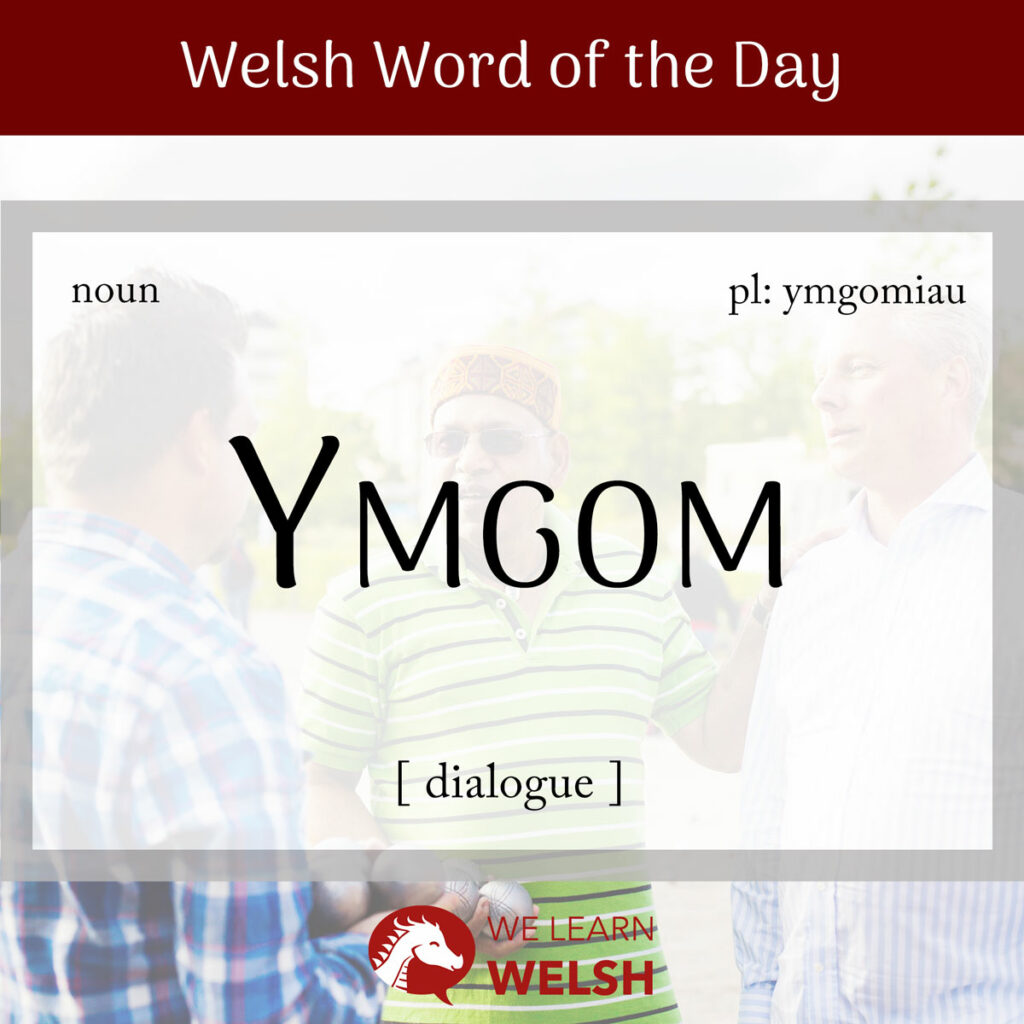As a child, my siblings and I really enjoyed taking part in eisteddfodau (Eisteddfods), a traditional Welsh arts festival based around a series of contests. There’s an organisation, Urdd Gobaith Cymru (The League of Welsh Hope) that organises eisteddfodau for young people, often high-school students.
One of my favourite competitions was the ymgom, which in the context of the Eisteddfod meant a short play performed by three or four people. As a Welsh word, it’s a feminine noun that means a dialogue or conversation. You can pluralise it as ymgomiau or ymgomion.
ymgom
a dialogue / a conversation / a short play
There is also a verb form, ymgomio. As you might imagine, this means to converse or to discuss. However it’s not really that common in conversation – it’s more of a literary term.
There is record of the verb form being used as early as the 16th century, often spelt slightly differently as ymgommio or ymgomnio. So it’s likely that ymgom evolved from ymgomio and not the other way around.
Another clue is that the prefix ym is often added to verbs in Welsh to make them reflexive, and there’s record of a word comio being used to mean to converse in 16th and 17th century written Welsh documents. Adding the pieces together, ym was probably combined with comio to create ymgomio (to converse together), later producing the noun form.
When it began being used to describe the short play category in the Eisteddfod is unclear – but it’s likely that this innovation is what has preserved the word. Things may differ in other parts of the country, but I don’t think I’ve ever heard it used outside of this context.
There are other words, too, coming from this root, all of which are attested as having been well-used a couple of centuries ago. Examples include ymgomiwr (a conversationalist), ymgomiol (chatty) and ymgomiad (a synonym of ymgom itself).
Ro’n i’n meddwl ei bod hi’n dda iawn yn yr ymgom.
I thought she was very good in the ymgom.
You may wonder why I’ve picked ymgom for today’s Welsh word of the day given that it’s so old-fashioned! The answer is that, as its use does persist in the specific context of Eisteddfods, I think it reveals an important (and fun) part of Welsh culture.
For example, if you ever wanted to participate in an Eisteddfod, you might end up actio yn yr ymgom (acting in the ymgom). You’d hope to be able to dysgu’r llinellau (learn the lines) on time and rhoi perfformiad da (put on a good performance), and that your fellow chwaraewyr (actors) were up to the job too. If you’re lucky and do really well, you could even ennill yr ymgom (win in the ymgom category).
(In my translations here, I’ve left ymgom in Welsh, because that’s what I always did when speaking about ymgomion in English. Like Eisteddfod itself, it’s one of those Welsh words that I feel doesn’t fully retain its meaning when translated.)
So I hope you can forgive this slightly esoteric choice! Still, in the spirit of utility, here are some synonyms you’ll be more likely to hear in a conversation.
- ymddiddan (dialogue / conversation)
- sgwrs (chat / conversation)
- araith (speech)
- disgwrs (discourse / conversation, largely Southern)
- dialog (dialogue, specifically in a theatrical context)
- gom (chat)
You might have guessed that the last option is short for ymgom itself. It’s not used much, but more than the long form.
Gobeithio y bydda i’n cael fy newis ar gyfer yr ymgom.
I hope I’ll be chosen for the ymgom.
Ymgom itself will always hold a special place in my heart, both the word itself and the competition. What about you – would you ever give cystadlu yn yr ymgom (competing in the ymgom) a go?


